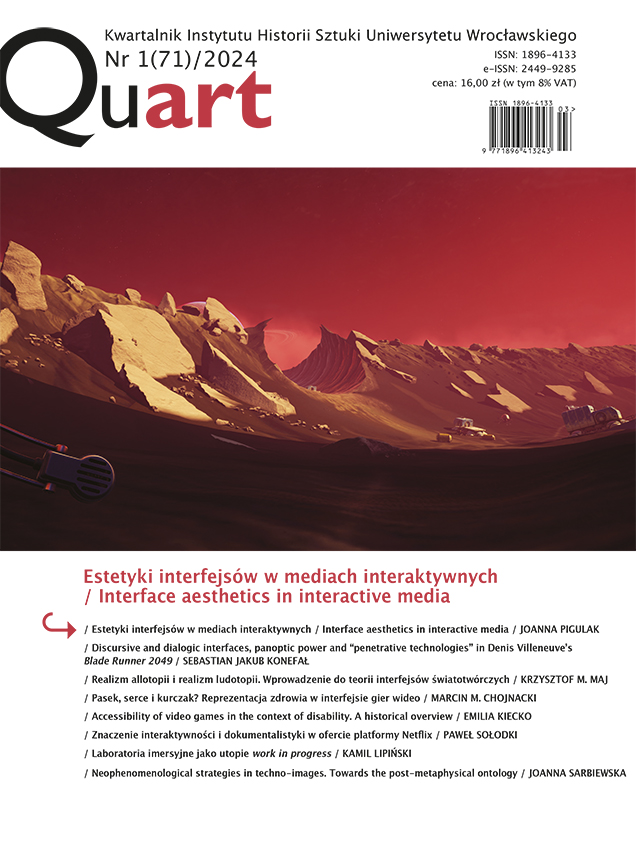

Artykuły

The article aims at tackling the issue of realist interfaces whilst answering a question of whether there is such a thing as a realist interface and whether it remains relevant to user experience design in video games at all. Having utilized the nomenclature of cognitive and transmedial narrative theory, narrative-driven world-building studies, and game studies, the author proceeds to critical examination of interfaces in Dark Souls, Elden Ring, Baldur’s Gate 3, Divinity: Original Sin 2 and Red Dead Redemption 2, in order to trace most bothersome components that can badly influence the learning curve of the player as well as the experience of coherent gaming reality. This examination aims to distinguish the realism within the ludotopia (i.e. the gameworld) and the allotopia (i.e. the imagined world wherein the gameworld can exist), addressing the needs related to understanding game rules and the principles governing the designed reality. The article concludes with a proposal of five different criteria (competence, predisposition, consequence, navigation, and perception) of world-building interfaces and a revision to the current structural classification of diegetic and non-diegetic interfaces.
Aarseth Espen J., Günzel Stephan, Introduction: Space – The Theoretical Frontier, [w:] Ludotopia: Spaces, Places, and Territories in Computer Games, ed. iidem, Bielefeld 2019.
Bakun Martyna, Algorytmy osobiste. Analiza zagadnienia amatorskich gier autobiograficznych udostępnionych na platformie itch.io, „Zeszyty Naukowe Towarzystwa Doktorantów Uniwersytetu Jagiellońskiego. Nauki Humanistyczne” 2019, nr 1.
Calleja Gordon, In-game: From Immersion to Incorporation, Cambridge (Massachusetts) – London 2011.
Fagerholt Erik, Lorentzon Magnus, Beyond the HUD: User Interfaces for Increased Player Immersion in FPS Games, Göteborg 2009.
Frelik Paweł, The Master’s Digital Tools: Cognitive Capitalism and Non-normative Gaming Practices, „Journal of Gaming & Virtual Worlds” 2016, nr 2.
Jenkins Henry, Game Design as Narrative Architecture, [w:] First Person: New Media as Story, Performance, and Game, ed. N. Wardrip-Fruin, P. Harrigan, Cambridge (Massachusetts) – London 2004.
Jørgensen Kristine, Time for New Terminology? Diegetic and Non-Diegetic Sounds in Computer Games Revisited, [w:] Game Sound Technology and Player Interaction: Concepts and Developments, ed. M. Grimshaw, Hershey 2011.
Jørgensen Kristine, Gameworld Interfaces, Cambridge (Massachusetts) 2014.
Klastrup Lisbeth, The Worldness of EverQuest: Exploring a 21st Century Fiction, „Game Studies” 2009, nr 1, http://gamestudies.org/0901/articles/klastrup (data dostępu: 24.11.2016).
Kłosiński Michał, Hermeneutyka gier wideo. Interpretacja, immersja, utopia, Warszawa 2018.
Kubiński Piotr, Gry wideo. Zarys poetyki, Kraków 2016.
Maj Krzysztof M., On the Pseudo-open World and Ludotopian Dissonance: A Curious Case of „Cyberpunk 2077”, „Journal of Gaming & Virtual Worlds” 2022, nr 1.
Pearce Celia, Communities of Play: Emergent Cultures in Multiplayer Games and Virtual Worlds, Cambridge (Massachusetts) 2009.
Raskin Jef, The Humane Interface: New Directions for Designing Interactive Systems, Boston 2011.
Ryan Marie-Laure, Why Worlds Now?, [w:] Revisiting Imaginary Worlds, ed. M. J. P. Wolf, London 2016.
Saint-GelaisRichard, L’ Empire du pseudo. Modernités de la science-fiction, Québec 1999.
Thon Jan-Noël, Transmedial Narratology and Contemporary Media Culture, Lincoln–London 2016.
Toft-Nielsen Claus, „It’s Such a Wonderful World to Inhabit”. Spatiality, Worldness and the Fantasy Genre, „Akademisk Kvarter” 2013, t. 7.
Venus Jochen, Simulation of Self-Action: On the Morphology of Remote-Controlled Role Playing, [w:] Logic and Structure of the Computer Game, ed. S. Günzel, M. Liebe, D. Mersch, coop. S. Möring, Potsdam 2010
Voorhees Gerald, Dyskursywne gry i dyskursy gier, [w:] Dyskursy gier wideo, red. M. Kłosiński, K. M. Maj, Kraków 2019.
Zimmerman Eric, Gaming Literacy: Game Design as a Model for Literacy in the Twenty-First Century, [w:] The Video Game Theory Reader 2, ed. B. Perron, M. J. P. Wolf, New York – London 2009.